-
 Israel kills Hamas commander in Lebanon strike
Israel kills Hamas commander in Lebanon strike
-
Trump unveils first $5 million 'gold card' visa
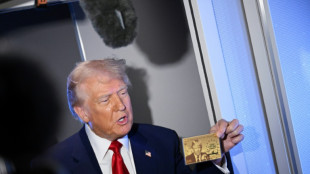
-
 Crashes, fires as Piastri fastest in chaotic second Japan GP practice
Crashes, fires as Piastri fastest in chaotic second Japan GP practice
-
India and Bangladesh leaders meet for first time since revolution
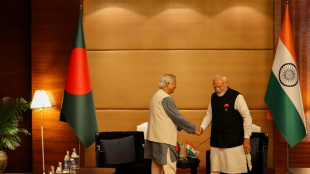
-
 Israel expands ground offensive in Gaza
Israel expands ground offensive in Gaza
-
Families of Duterte drug war victims demand probe into online threats

-
 Stocks extend global rout after Trump's shock tariff blitz
Stocks extend global rout after Trump's shock tariff blitz
-
Kolkata's Iyer more bothered about impact than price tag

-
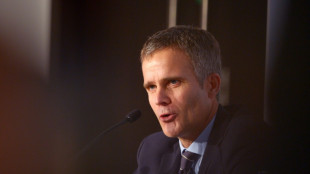 BP chairman to step down after energy strategy reset
BP chairman to step down after energy strategy reset
-
Indian patriotic movie 'icon' Manoj Kumar dies aged 87

-
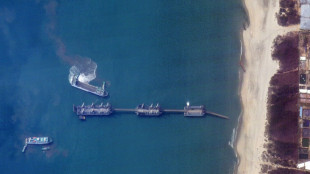 China floats battle barges in Taiwan invasion plans
China floats battle barges in Taiwan invasion plans
-
McLaren's Piastri fastest in chaotic second Japanese GP practice

-
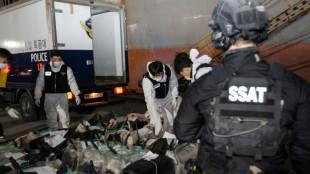 South Korea seize two tons of cocaine in largest-ever drug bust
South Korea seize two tons of cocaine in largest-ever drug bust
-
Pacific nations perplexed, worried by Trump tariffs
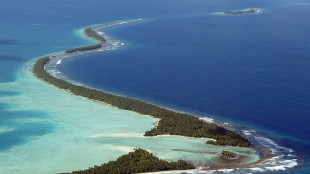
-
 The race to save the Amazon's bushy-bearded monkeys
The race to save the Amazon's bushy-bearded monkeys
-
TikTok must find non-Chinese owner by Saturday to avert US ban

-
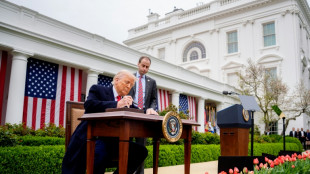 Trump tariffs to test resiliency of US consumers
Trump tariffs to test resiliency of US consumers
-
Clamping down on 'forever chemicals'

-
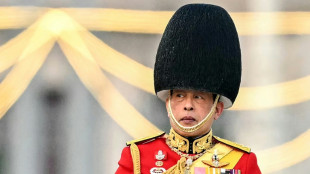 Prominent US academic facing royal insult charge in Thailand
Prominent US academic facing royal insult charge in Thailand
-
Yana, a 130,000-year-old baby mammoth, goes under the scalpel

-
 'Don't want to die': Lesotho HIV patients look to traditional medicine
'Don't want to die': Lesotho HIV patients look to traditional medicine
-
Curry scores 37 as Warriors outgun LeBron's Lakers

-
 Crops under threat as surprise March heatwave hits Central Asia: study
Crops under threat as surprise March heatwave hits Central Asia: study
-
Japan PM says Trump tariffs a 'national crisis'

-
 Security 'breakdown' allows armed men into Melbourne's MCG
Security 'breakdown' allows armed men into Melbourne's MCG
-
Norris fastest in Japan GP first practice, Tsunoda sixth on Red Bull debut

-
 Albon says Thailand taking bid for F1 race 'very seriously'
Albon says Thailand taking bid for F1 race 'very seriously'
-
'It's gone': conservation science in Thailand's burning forest
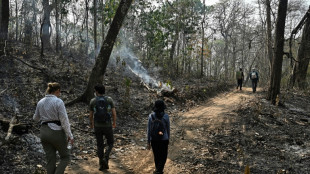
-
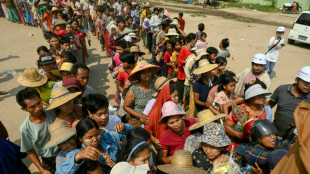 Protest as quake-hit Myanmar junta chief joins Bangkok summit
Protest as quake-hit Myanmar junta chief joins Bangkok summit
-
EU leaders push for influence at Central Asia summit
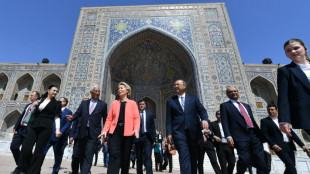
-
 Asian stocks extend global rout after Trump's shock tariff blitz
Asian stocks extend global rout after Trump's shock tariff blitz
-
Lewandowski, Mbappe duel fuelling tight La Liga title race

-
 South Korea court upholds President Yoon's impeachment, strips him of office
South Korea court upholds President Yoon's impeachment, strips him of office
-
Liverpool march towards title as Man City face Man Utd

-
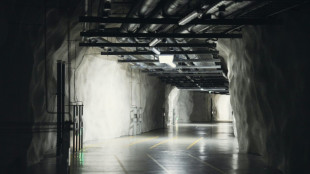 Finland's colossal bomb shelters a model for jittery Europe
Finland's colossal bomb shelters a model for jittery Europe
-
Athletes frustrated as France mulls Muslim headscarf ban in sport

-
 Korda downs Kupcho to stay alive at LPGA Match Play
Korda downs Kupcho to stay alive at LPGA Match Play
-
German industry grapples with AI at trade fair

-
 Irish school trains thatchers to save iconic roofs
Irish school trains thatchers to save iconic roofs
-
'Frightening': US restaurants, producers face tariff whiplash
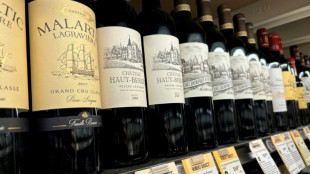
-
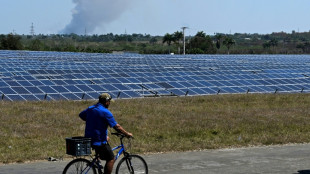 Cuba looks to sun to solve its energy crisis
Cuba looks to sun to solve its energy crisis
-
Experts warn 'AI-written' paper is latest spin on climate change denial

-
 PSG eye becoming France's first 'Invincibles'
PSG eye becoming France's first 'Invincibles'
-
Late birdie burst lifts Ryder to Texas Open lead

-
 Five potential Grand National fairytale endings
Five potential Grand National fairytale endings
-
Trump purges national security team after meeting conspiracist
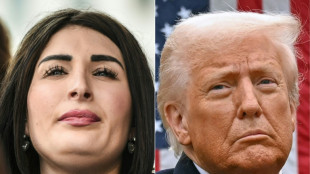
-
 More work for McIlroy even with two wins before Masters
More work for McIlroy even with two wins before Masters
-
Trump hopeful of 'great' PGA-LIV golf merger
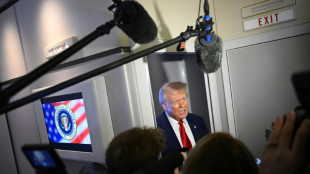
-
 No.1 Scheffler goes for third Masters crown in four years
No.1 Scheffler goes for third Masters crown in four years
-
Helium One Global Ltd Announces Jackson-29 Operational Update

Germany doesn't want any more migrants?
Germany, once a beacon of openness during the 2015 migrant crisis when it welcomed over a million refugees, appears to be undergoing a profound shift in its stance on immigration. Under the leadership of Friedrich Merz, the newly elected chancellor from the Christian Democratic Union (CDU), the country is tightening its borders and rethinking its reliance on foreign labour. This pivot, driven by economic pressures, security concerns, and a resurgent far-right, raises questions about the future of a nation long defined by its post-war commitment to multiculturalism and economic pragmatism.
A Legacy of Openness Under Strain:
Germany’s immigration policy has historically been shaped by necessity and morality. After World War II, the "Wirtschaftswunder—the economic miracle—relied" on "Gastarbeiter" (guest workers) from Turkey and southern Europe to rebuild the nation. In 2015, Chancellor Angela Merkel’s decision to open borders to Syrian and other refugees was both a humanitarian gesture and a bid to bolster an ageing workforce. By 2020, immigrants and their descendants comprised 26% of Germany’s 83 million residents, per the Federal Statistical Office, contributing significantly to sectors like manufacturing and healthcare.
Yet, the mood has soured. The CDU’s victory in the 23 February 2025 federal election, securing 28.5% of the vote, came amid a surge for the anti-immigrant Alternative für Deutschland (AfD), which captured 20%. Merz, forming a coalition with the Social Democratic Party (SPD), has vowed to address what he calls “uncontrolled inflows,” signalling a departure from Merkel’s legacy.
Economic Pragmatism Meets Saturation:
Germany’s economy, Europe’s largest, has long depended on immigrants to fill labour gaps. In 2024, the Institute for Employment Research (IAB) estimated a shortage of 400,000 skilled workers, particularly in engineering and nursing. The birth rate, at 1.5 children per woman, remains well below replacement level, amplifying the need for foreign talent. So why the reversal?
Uneducated immigrants are a burden on the German welfare system:
Analysts point to a saturation point. Unemployment, though low at 5.5% in 2024, masks regional disparities and a growing perception that immigrants strain welfare systems. The influx of 200,000 Ukrainian refugees since 2022, while largely welcomed, has stretched housing and social services, with cities like Berlin reporting a 20% rise in rents over two years. Merz has argued that Germany must “prioritise integration over importation,” citing a 2024 Interior Ministry report that 30% of recent arrivals remain jobless after five years—a statistic seized upon by critics of open borders.
Security and the Far-Right Shadow - Too many Migaten are simply criminal:
Security concerns have further fuelled the shift. High-profile incidents, such as the December 2024 knife attack in Mannheim by an Afghan asylum seeker, which left three dead, have reignited debates about vetting and deportation. The AfD, capitalising on such events, has pushed a narrative of “immigrant crime,” despite data showing that foreign nationals’ offence rates (excluding immigration violations) align with those of native Germans. Merz, while distancing himself from the AfD’s rhetoric, has pledged tougher asylum rules and faster removals of rejected applicants, a nod to public unease.
The far-right’s electoral gains—126 projected Bundestag seats—have pressured mainstream parties to act. Posts on X reflect a polarised populace: some decry “a betrayal of German values,” while others cheer “a return to sovereignty.” Merz’s coalition, balancing the SPD’s pro-immigration leanings, must navigate this divide.
Policy Shifts and Global Implications:
Concrete measures are emerging. In February 2025, Merz announced plans to cap asylum applications at 100,000 annually—down from 300,000 in 2023—and expand “safe third country” agreements, allowing deportations to nations like Turkey. The Skilled Immigration Act, liberalised in 2023 to attract professionals, faces scrutiny, with proposals to raise income thresholds and tighten language requirements. Meanwhile, the EU’s New Pact on Migration, which Germany endorsed in 2024, is under review as Berlin seeks stricter external border controls.
Globally, this retrenchment could dim Germany’s image as a progressive leader. Its ageing population—projected to shrink to 79 million by 2050 without immigration—poses a long-term economic risk. The Confederation of German Employers (BDA) warned in January 2025 that curtailing inflows could cost 1% of GDP growth annually by 2030. Yet, political expediency seems to trump such forecasts for now.
A Nation at a Crossroads:
Germany’s turn from immigration reflects a confluence of pressures: economic limits, security fears, and a populist tide. It does not signal an absolute rejection—labour shortages ensure some openness persists—but a recalibration towards control and selectivity. For Merz, the challenge is twofold: assuaging a restive electorate while preserving the economic engine that immigrants have long fuelled. Whether this balancing act succeeds will shape not just Germany’s future, but Europe’s.

Georgia Slips into Russia’s Grasp

Trump’s Ukraine Economic Colony Plan Stirs Debate

China Targets Dollar at US Critical Moment

EU Pledges €800 Billion for Defence to Deter Russia

Israel escalates War to crush Hamas

Trump, Putin and the question: What now?

Canada challenges Trump on Tariffs

Nuclear weapons for Poland against Russia?

Rebellion against Trump: "Ready for War?"

Ukraine: Problem with the ceasefire?

Ukraine Loses Kursk: A Collapse?



